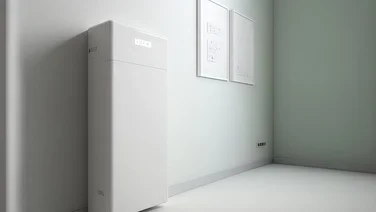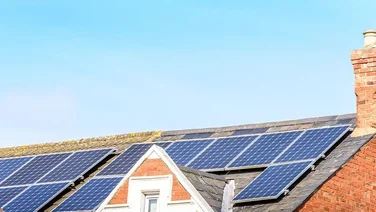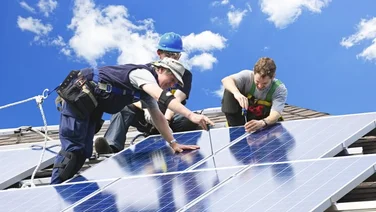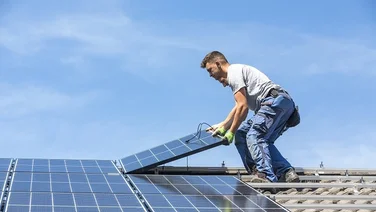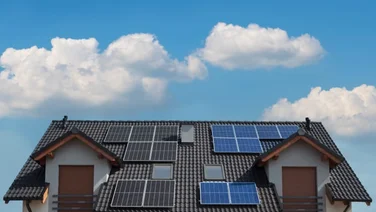We receive a small fee from trusted installers when you request a quote through our site. This helps us keep our content independent, well-researched and up to date – Learn more
- What’s on this page?
- How long do solar panels last?
- Which type of solar panel lasts the longest?
- What’s the average solar panel warranty?
- Why do solar panels become less efficient over time?
- How can you make your solar panels last longer?
- Should you get solar panel insurance?
- How should you dispose of disused solar panels?
- Next steps
- FAQs
✔ Depending on the manufacturer, solar panels usually last between 25-30 years
✔ Modern solar panels have a low rate of degradation: around 0.2%-0.3% per year
✔ Monocrystalline panels tend to last longer than polycrystalline panels
Just as solar panel prices are going down with time, so will your panels’ efficiency – and eventually, they’ll break entirely. Luckily, you have at least 25-30 years before your solar panels go completely kaput – but of course, this will depend on a few factors.
To give you a better idea of how long you can expect your solar panels to last, check out the article below. You can find out how to give solar panels a new zest for life, why your panels might be underperforming, and how to dispose of them once they need replacing.
Once your solar panels eventually reach the end of their lives, it’s time to explore the plethora of new systems on the market.
You can make it much easier to find the best deal for your home by using our free comparison tool. All you have to do is answer a few simple questions about your property, and our suppliers will be in touch with free quotes for you to compare.
Where do you want to install solar panels?
Get started
What’s on this page?
How long do solar panels last?
Depending on the manufacturer, solar panels will last between 25-30 years – with most still producing electricity long after this, but at a lower rate.
Solar panel life expectancy can be difficult to work out, since they haven’t been on the market for very long. In fact, there’s currently only a tiny portion of residential panels older than 10 years.
However, manufacturers are able to make pretty accurate predictions on how long solar panels will last, based on something called a ‘rate of degradation’. This term basically refers to the speed at which panels lose their efficiency and output over time.
Thankfully, modern solar panels have an extremely low rate of degradation: around 0.2%-0.3% per year. This means solar panels lose very little of their total capacity over time – and if you pick a company like Project Solar, you can get a lifetime warranty.
To summarise – solar panels last a really long time.
Which type of solar panel lasts the longest?
Monocrystalline and polycrystalline are two different types of solar panels – both capture energy from the sun and turn it into electricity, and are also made from silicon.
However, when it comes to longevity, monocrystalline panels have the upper hand. While both types of panels typically come with a 25-year warranty, monocrystalline panels have a longer lifespan.
According to the American Solar Energy Society, monocrystalline solar panels last around 40 years, whilst polycrystalline models last roughly 35 years.
It’s worth bearing this in mind when it comes to buying your set of solar panels. Whilst comparing panels, you’ll notice that monocrystalline models are usually on the more expensive side, but it’ll be worth it for the extra years of life – not to mention they tend to have a higher efficiency rating.
What’s the average solar panel warranty?
Solar panel warranties vary, depending on the manufacturer and model you go for.
Generally, the panels will be covered for 10-25 years, which is probably why 69% of people are likely to buy or rent a property with solar panels, according to our National Home Energy Survey.
This performance warranty will typically guarantee 90% production at 10 years and 80% at 25 years.
Of course, there is much more to these complex systems than the panels. Luckily, many of the other components come with a warranty too, including batteries, which are usually covered for roughly 5-15 years, and inverters, which are typically covered for between 5-10 years.
Where do you want to install solar panels?
Get started
Why do solar panels become less efficient over time?
Research by the International Energy Agency (IEA) suggests that the most common causes of solar panel expiry are:
- Optical failure (loss of efficiency, caused by light not being not being absorbed, or being reflected from the front surface) – 20% of cases
- Power loss – 19% of cases
- Junction box (a component where the PV strings are electrically connected) – 19% of cases
- Glass breakage – 10% of cases
Since solar panels don’t have any moving parts, there aren’t too many risks of your system going kaput out of the blue.
There are, however, a lot of external factors that can cause wear and tear on a solar panel system.
The most common factor that reduces a solar panel’s lifespan is ‘soiling’, which is when elements like snow, dirt, dust, and other particles accumulate on the panel’s surface. This becomes even more of an issue if the panels are fitted on a flat roof, not at the optimal angle of 20-50 degrees.
Studies have shown that even at a tilt of 30 degrees, an average of 1% solar radiation is lost from dust collecting on the surfaces of solar panels – with the highest loss at 4.7%.
How can you make your solar panels last longer?
If you look after your solar panels, they’ll reward you with years of free energy. There are a few ways you can give your panels a helping hand, including:
- Avoiding any physical damage to the surface of the panels – the more scratches, the higher the rate of degradation
- Carrying out maintenance checks regularly – look out for loose racks, cracks in the surface of the panel, and exposed wires
- Cleaning your panels regularly – especially after snowy or stormy weather, to brush off any debris
- Making sure panels are installed properly – research solar providers, manufacturers, and installers, checking their track record of successful installations
- Keeping birds and other critters away from the panels – Pigeon-proofing solar panels is important as pigeons can reduce efficiency by covering panels with poo, and by climbing on the surface
Of course, these techniques will only last for so long – there will be a time where you’ll have to face the music and get a new set of solar panels. That’s where we come in.
We can make the process much easier, saving you time and money. Use our free comparison tool to tell us a bit about your property, and our suppliers will be in touch shortly with free quotes for you to compare.
Should you get solar panel insurance?
Solar panel insurance is definitely worth looking into. This way, you’ll be able to protect your solar panel system from all sorts – including natural disasters and theft, but probably not including accidental damage.
And, given the average cost of solar panels for a three-bedroom household is £7,026, this cover can certainly come in handy.
Are solar panels covered by home insurance?
Buildings insurance policies usually include the option to have solar panels because they’re part of the fixtures of your home.
It’s worth contacting your insurer before you get the panels installed to see whether your policy includes a photovoltaic system.
The average annual cost of building insurance is £119.22, according to the AA’s British Insurance Premium Index. Adding solar panels to this might increase the cost of your home insurance, but not by much. And, with thousands of pounds of equipment being covered, this insurance is certainly a small price to pay. Check out: The A to Z of Solar Panels.
How should you dispose of disused solar panels?
Solar panels are great for the planet – unless they’re discarded recklessly, that is.
It’s estimated that at the end of 2016, cumulative global PV waste reached 43,500-250,000 metric tonnes. Plus, looking forward, Europe is predicted to present the second-largest PV waste market, with a projected waste of up to 3 million tonnes by 2030.
But it doesn’t need to be like this – solar panel owners can easily recycle panels instead of sending them to landfill.
And you barely have to do anything, either!
Once it’s time to replace your panels, all you need to do is get on the phone with your solar panel installer and let them do the hard work.
Under EU regulations, solar panel installers are legally obliged to take your old solar panels off you, or at least fund a Distributor Take-back Scheme (DTS).
And, to make sure all panels are collected and recycled properly, every solar panel company in the UK has to join a Producer Compliance Scheme (PCS), such as the Government-approved PV CYCLE.
Alternatively, you can make a few quid by selling your panels on platforms like eBay or Gumtree – just don’t expect to get much for them, since it’s pretty uncommon for people to buy second-hand panels.
Next steps
Although solar panels usually last between 25-30 years, the lifespan really comes down to you – the owner. If you give your panels a bit of tender love and care, you’re much more likely to get a few extra years out of them.
If you neglect your panels, let pigeons poo on them, or have branch scratches smeared on the surface, well, then you’re asking for short-lived panels.
And, whenever the time comes to replace your panels, find the best deal by using our free comparison tool.
You’ll be guided through a few simple questions about your property, and we’ll then put you in touch with our suppliers, who will have free quotes for you to compare.
FAQs
How do you know when solar panels need replacing?
The top three ways you can assess whether it’s time to replace your panels is to note:
- Their performance and output – If you notice that you’re paying more for electricity than you used to, it’s worth examining the solar energy output. If your panels are performing at a lower rate, it might be a sign that it’s time to replace solar panels
- The age of the models – You might notice a drop off in performance after the 25-30 year mark. Although your panels will still generate electricity, you’ll probably find that the amount of electricity won’t reach the levels it once was
- Physical degradation – Given panels spend their lives exposed to the elements, it’s normal to expect general wear and tear over the years. You should get in touch with a solar panel expert if you see burnt and discoloured surfaces, which can indicate that the panel laminate has corroded. Likewise, if you can see small cracks in the panel, which can be caused by extreme changes in temperature or hailstorms, it’s time to replace them
Do solar panels need maintenance?
Yes, like any other piece of tech equipment, it’s important to look after your solar panels to make sure they continue working properly. There are a few things you can do to keep your solar panels in tip-top condition, including:
- Getting your panels serviced
- Checking for any issues
- Cleaning your solar panels
- Removing potential dangers
- Keeping solar panels out of the shade
- Making sure the inverters are flashing green
- Checking the day-to-day performance
If you want to learn more, head to our page on solar panel maintenance.
How efficient are solar panels after 25 years?
Today’s solar panels have an extremely low rate of degradation of around 0.2%-0.3% per year. That means, at the end of a 25-year warranty, your panels should still produce energy at around 92.5% of their rated output – but there are lots of external factors that can impact this figure.


